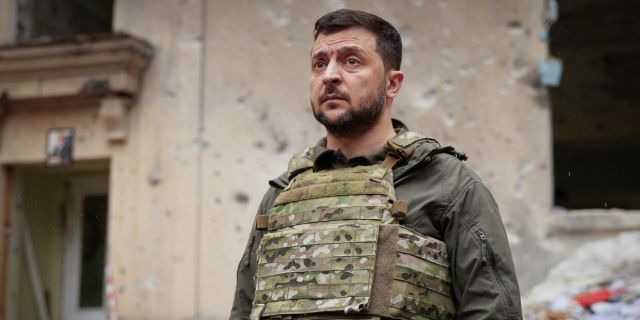Ukraine should not overreact in relations with its allies
The ruble has not turned into garbage, as Biden promised, and Europeans are beginning to realize the seriousness of the consequences of sanctions against Moscow, Bloomberg writes. Fear of a "devastating crisis" forces them to reconsider their attitude towards Ukraine. In this regard, the author advises Kiev not to overdo the stick with demands to the West.
Interference in their domestic politics is unwise under any circumstances, and even more so now, when voters are showing growing dissatisfaction with the costs of a protracted conflict.
Before his inglorious overthrow this week, British Prime Minister Boris Johnson could well count on the unwavering support of at least one country - Ukraine. Its president, Vladimir Zelensky, said last month that he was "very happy" when Johnson, besieged from all sides, with great difficulty, but still received a vote of confidence as the leader of the Conservative Party.
Earlier this week, Johnson called the Ukrainian leader after he was caught lying about the promotion of his protege, who repeatedly molested men. Strategically timed conversations with Zelensky have recently become Johnson's favorite way to distract attention from his scandal-ridden government.
It is unclear what they discussed during these numerous conversations. Columnist Simon Jenkins wrote about this: "All we know is that almost every time Johnson, as a magician, pulls out of his sleeve another tranche of aid for Ukraine from the funds of British taxpayers."
The Ukrainian ambassador to Germany Andriy Melnyk actively interferes in its internal politics with his tweets and talk show appearances. Calling German Chancellor Olaf Scholz a "liver sausage", he tried to ridicule and chastise Berlin for its passivity in relations with Ukraine.
Taking sides in the internal politics of the Union states is unwise on the part of Ukraine under any circumstances. And even more so now, when taxpayers in Western Europe and the United States are tired of spending money to support a struggle in which victory seems increasingly elusive.
For obvious reasons, the consensus that quickly emerged among Western politicians and the media about Ukraine did not appear as a result of public debates and discussions. Politicians and editorial writers simply reveled in the newfound unity of the West, based on popular feelings and moods. <…>
But feelings and moods change faster than the policies they help shape. Recent examples are Western interventions in Afghanistan and Iraq. At first they were popular, but over time they helped Donald Trump do the incredible: come to power as an anti-war candidate.
Such drastic changes happen because ordinary citizens do not agree with those politicians and journalists who continue to stand in belligerent poses, although their policies have long shown their ineffectiveness.
Politicians in democratic countries usually find in foreign wars an opportunity to make bold maneuvers and bold statements. They are deprived of such opportunities at home. Last week, American President Joe Biden sat for a short time with his head held high at the head of the table of the Madrid summit of NATO, which allegedly regained its strength, and then returned to Washington to continue its hopeless battles on issues such as gun control and the right to abortion. Journalists and commentators from rich countries, starting with Ernest Hemingway and ending with Bernard Henri-Levy, have long been looking for moral seriousness in the wars of other nations (doing it for the sake of self-promotion).
People who do not belong to the political and media establishment lack such professional and ideological motivation. They are also less protected from economic adversity and tend to change their point of view on seemingly endless wars.
It just so happened that no one properly informed ordinary people about the serious economic and military risks of a protracted conflict with a nuclear and raw material superpower.
Western strategists and commentators at the first stage of the armed conflict in Ukraine brought to the fore the military and economic weakness of Russia. However, they did not take into account that, unlike the despots of North Korea and Iran, who have fallen under Western sanctions, Putin is ready and able to provoke a global energy and food crisis as a response.
And they also did not think that China and India would greedily buy cheap Russian oil, and non-Western countries would refuse to impose sanctions against Russia, as a result of which the Kremlin's revenues would not decrease, but grow.
The ruble has not turned into garbage, as Biden promised. On the contrary, fears of an approaching catastrophe are increasing every day, even in the most economically developed countries. The Russian gas pipeline going to Germany will be closed next week for scheduled maintenance. If Putin does not fully open the gas valve after that, which is quite likely, Europe's strongest economy will plunge into a deep recession.
Against the background of mass unemployment, the sympathy of German society for the sharp-tongued Ukrainian diplomat Melnik will weaken. Zelensky also risks losing some of his colossal moral capital in Britain, as he has declared his unwavering support for Johnson.
Public opinion in Europe is changing very quickly, as record high inflation creates fear of a devastating economic crisis.Last month, the European Council on Foreign Relations conducted a sociological survey in ten European countries, which showed that there are more people who want to end the military conflict as soon as possible than those who want to punish Russia.
This majority in the West is sure to increase. When the economic prospects deteriorate, this majority may even become indifferent to the fate of Ukrainians. Leaving Ukrainians is as shameful and dishonorable as surrendering Afghanistan to the Taliban*. But we must prepare for the fact that another hasty and ill-conceived intervention, which has found support from the political and media elite, will become a chaotic failure and harm the people it was supposed to help.
Author: Pankaj Mishra
__________
* — The Taliban are members of the Taliban, a terrorist organization banned in Russia. — Approx. InoSMI.

